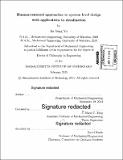Human-centered approaches to system level design with applications to desalination
Author(s)
Yu, Bo Yang,, Ph. D. Massachusetts Institute of Technology
DownloadFull printable version (16.16Mb)
Other Contributors
Massachusetts Institute of Technology. Department of Mechanical Engineering.
Advisor
Maria C. Yang.
Terms of use
Metadata
Show full item recordAbstract
The goal of this thesis is to better understand the design practice employed by the desalination industry from a systems-level viewpoint and offer recommendations to improve the process of design. A human-centered design research approach is used, in which industry practitioners were interviewed about the design strategies they employ for industrial desalination systems. A common theme from the interviews is that long term performance of desalination systems needs to be emphasized during the design process. Based on this observation, a novel design framework is proposed that incorporates health monitoring and maintenance in the design stage. The proposed framework is shown to make the design process more effective and can result in more optimal design over the lifecycle of a plant. The interviews also suggest open questions about how designers use computational tools for the design of desalination system. An investigation of how designers respond to the complexity of desalination parameter design problems was conducted. The behavior of designers during a series of simulated design processes involving seawater reverse osmosis (SWRO) plants was observed. The experiments revealed that desalination knowledge seemed to lead to better performance, but the results also showed that subjects with limited desalination knowledge could perform worse than subjects with no desalination knowledge. It was also observed that human designers had difficulties understanding the sensitivity of coupled variables, which can lead to poor performance on parameter design problems. Additionally, the top-performance-ranked subjects were observed to behavior very differently from the bottom-ranked. The problem-solving profiles of best performing subjects resembled a well-tuned simulated annealing algorithm while the worst performing subjects used a pseudo random search strategy.
Description
Thesis: Ph. D., Massachusetts Institute of Technology, Department of Mechanical Engineering, 2015. Cataloged from PDF version of thesis. Includes bibliographical references (pages 153-160).
Date issued
2015Department
Massachusetts Institute of Technology. Department of Mechanical EngineeringPublisher
Massachusetts Institute of Technology
Keywords
Mechanical Engineering.
